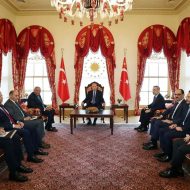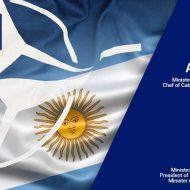The sudden shifts in the UAE’s foreign policy over the past few months may seem confusing to those trying to understand its goals. However, with a little scrutiny, it becomes clear that Abu Dhabi, throughout its history, has developed its policies to achieve its interests in accordance with regional and international realities.
In the aftermath of the September 11 attacks, and in order to prove its good intentions, the UAE merged with the US’ strategy, raising slogans about the “war on terror” and “Whoever is not with us is against us.” Abu Dhabi rushed to issue statements against extremism and violence and cut ties with the Taliban government.
Abu Dhabi’s integration into the American strategy increased after the fall of Iraq, which caused an imbalance of power in the region, leaving the Gulf states worried about the intentions and ambitions of regional powers, especially Iran.
Arab Spring opportunity
With the decline of American interest in the Middle East following the presidency of Barack Obama in the United States in 2008, and with Washington seeking to improve its relationship with Tehran, the Gulf states found themselves facing a serious threat. This threat multiplied with the outbreak of the Arab Spring revolutions in 2011.
Despite these threats, Abu Dhabi found an opportunity to accelerate its foreign policy ambitions to be an influential player in regional power politics away from the conservative policies that focused on self-preservation.
The UAE saw the rise of political Islam movements that coincided with the Arab Spring as a key opportunity to increase influence and build new narratives about itself in the region, rushing to explore broader external relations away from traditional allies of the Gulf Cooperation Council in the West including China, India and Russia.
To achieve these goals, the UAE has turned to a resolute foreign and military policy aimed primarily at suppressing the Muslim Brotherhood and any other extremist groups, including al-Qaeda and the Islamic State. But these goals extended to contain Iranian influence as much as possible.
Their goals did not stop there. Rather, the UAE saw that it could, by playing an influential role regionally, achieve broad economic interests that would not be easily achieved in normal circumstances.
The UAE saw the opportunity to be a middle regional power that could achieve its economic interests in the region through two ways:
– Preventing fundamental changes in the traditional conservative regimes that collapsed in front of street protests in more than one Arab capital.
– Ensuring freedom of navigation in the straits in the Middle East, especially in the Arabian Peninsula.
Deploying force
The Emirati strategy to achieve these two goals was extremely flexible, to the extent that it can be said that it passed through two phases that differed in style and tools.
The first phase that lasted from 2011 to 2019 can be described as the policy of deploying force, which was characterized by military intervention and support for specific parties in conflict areas. The militias deployed by the Emiratis along the coastal cities and islands in Yemen were the most prominent of those interventions that helped Abu Dhabi to control those areas in an indirect way.
The hybrid naval war waged by Iran and Israel was an incentive for the UAE to intervene to ensure the security of navigation. But in light of the changing contexts that pushed Abu Dhabi to this type of intervention, it was natural to find a shift from “deploying power” to “diplomacy.”
This shift was encouraged by the decline in Washington’s interest in the Middle East under the current administration of President Joe Biden, especially after the recent US withdrawals from the region.
Influence protection
The second phase of the UAE foreign policy, which began in 2019, can be called the “influence protection” phase, as Abu Dhabi adopted a less assertive stance with the aim of preserving the geopolitical influence it achieved after 2011.
The beginning was with the Emirati military withdrawal from Yemen in 2019, and the Emirati disengagement from military barracks in Eritrea and Somaliland (2019-2021).
Simultaneously, Abu Dhabi pursued what is known as “straits” diplomacy. In 2019, the UAE joined the International Alliance for the Security and Protection of Maritime Navigation, led by the United States, in order to protect maritime navigation and international trade in the Strait of Hormuz.
With this repositioning, Abu Dhabi began to redraw the map of its alliances after re-evaluating its foreign policy, which was a prelude to its transformations in recent months.
The adjustments made by the UAE in its foreign policy did not mean abandoning its ambitions to play the role of a regional middle power. The adjustment is tactical, not strategic. This means that the policy of supporting the militias continues, although not apparent by diplomacy.
Notable transformations
The most notable transformation was the Al-Ula agreement concluded on January 4, 2021, which ended the Gulf crisis with Qatar, and the gradual restoration of relations with Turkey and Iran that followed.
The Emiratis were not satisfied with that, but they developed their relations with Israel through what was known as the Abraham Accords, and opened an embassy for it in Tel Aviv.
Abu Dhabi has also tried to develop pragmatic relations with Iran, as its largest economic partner in the Gulf. There were numerous meetings between its officials and Iranian officials.
The UAE has also overcome the state of tension that characterized the relations between it and Ankara, and the two capitals have witnessed mutual visits at the highest level, the most recent of which was the visit of Turkish President Recep Tayyip Erdogan to Abu Dhabi.
The UAE has also developed its relationship with Syria in a way that represents a breakthrough in its position towards the Assad government. Last November, UAE Foreign Minister Abdullah bin Zayed paid a visit to Syria, the first official visit by a senior Arab official to Damascus in years.
All previous moves represented a few steps back in its partnership, which amounted to an alliance with Israel, which was classified as an anti-Turkish-Iranian-Qatari alliance, with a desire to end the state of the axes it used at one time to secure its economic and geopolitical interests.
Accordingly, the UAE is trying to reposition itself according to the new data and prepare the ground to maximize the gains it has achieved over the past years.
By reversing its policy of axes, the UAE will be better able to achieve understandings with the concerned parties in the Syrian and Libyan crises, ensuring the realization of its economic aspirations and ambitions. With regard to Iran, Abu Dhabi will achieve important economic gains if sanctions against Iran are lifted, as this would become a western gateway to the Iranian market. The return of normal relations with Turkey will guarantee Abu Dhabi broad commercial and economic interests beneficial to both parties.









Leave a Reply